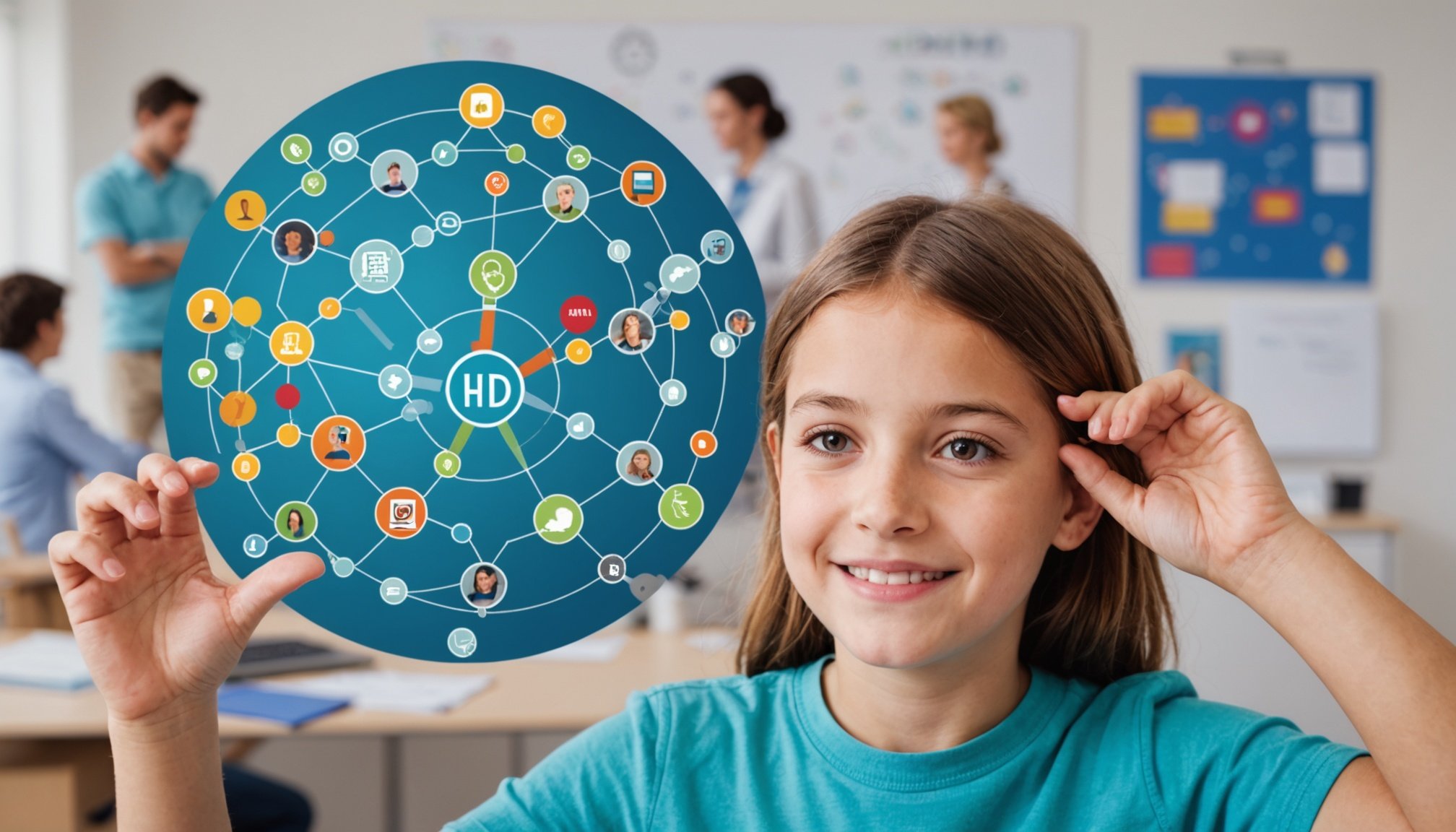Unlocking Success: Innovative Non-Medication Approaches for ADHD Management by UK Pediatricians
Managing Attention Deficit Hyperactivity Disorder (ADHD) is a complex and multifaceted task that requires a comprehensive approach. While medication is often a cornerstone of ADHD treatment, UK pediatricians are increasingly exploring and recommending innovative non-medication strategies to help children and young people manage their symptoms effectively. In this article, we will delve into these innovative approaches, highlighting their benefits, methodologies, and the support systems available.
Understanding ADHD and the Need for Holistic Management
ADHD is a neurodevelopmental disorder characterized by symptoms of inattention, hyperactivity, and impulsivity. It affects not only the individual but also their family and educational environment. The American Academy of Pediatrics (AAP) and UK health guidelines emphasize the importance of a multi-modal treatment approach that includes behavioral, educational, and psychological interventions alongside or instead of medication[1][4].
Additional reading : Tailoring sleep solutions: expert insights on shift work sleep disorder from uk specialists
Mind-Body Interventions: A Promising Avenue
Mind-body interventions, such as yoga, mindfulness, and meditation, have gained significant attention for their potential in managing ADHD symptoms. These practices aim to integrate the mind and body, promoting relaxation, emotional well-being, and attention control.
Benefits of Mind-Body Practices for ADHD
- Emotional and Behavioral Health: Mind-body techniques can reduce anxiety, stress, and pain while improving mood and emotional well-being. For example, a systematic review found that 11 out of 12 studies showed improvements in ADHD symptoms through mind-body therapies[2].
- Attention Control and Inhibitory Skills: Practices like yoga and mindfulness have been associated with enhanced attention control and inhibitory skills, crucial for individuals with ADHD. A controlled trial in Taiwan showed significant improvements in selective and sustained attention among children who participated in an eight-week yoga program[2].
- Holistic Approach: These interventions provide a holistic approach to managing ADHD, focusing on the overall well-being of the individual rather than just the symptoms. As Prof. Katya Rubia from King’s College London noted, “Mindfulness and other mind-body interventions have shown potential benefits, although more research is needed to fully understand their efficacy”[3].
Behavioral and Psychological Interventions
Behavioral and psychological approaches are fundamental in the management of ADHD. These interventions are designed to help individuals with ADHD and their families develop strategies to improve behavior and functioning.
Topic to read : Unlocking solutions: how uk pediatric endocrinologists are tackling childhood obesity
Parent Management Training
Parent Management Training (PMT) is a highly effective behavioral intervention. It involves educating parents on techniques such as operant conditioning, where rewards are given for good behavior and consequences for poor behavior. PMT also includes strategies like time-outs and the revocation of privileges. This approach has been shown to have a measurable effect on children with ADHD, improving their behavior and school performance[1].
Classroom Management
Classroom management is another critical aspect of behavioral interventions. Educators are trained to create a structured and supportive environment that helps students with ADHD stay focused. Techniques include increased structuring of classroom activities, daily feedback, and the use of token economies. Consistency among staff is key to the success of these strategies[1].
Cognitive Training and Neurofeedback
Cognitive training and neurofeedback are additional non-medication approaches that have been explored for ADHD management.
Working Memory Training
Working memory training has shown short-term improvements in ADHD symptoms, although the evidence for long-term benefits is limited. A meta-analysis of 14 randomized controlled trials concluded that more evidence is needed before cognitive training can be supported as a frontline treatment for core ADHD symptoms[1].
Neurofeedback
Neurofeedback involves training individuals to control their brain activity, which can help improve attention and reduce hyperactivity. While the research in this area is still evolving, some studies suggest that neurofeedback can provide lasting benefits, especially when combined with other interventions[3].
Physical Exercise and Nutrition
Physical exercise and nutrition play a vital role in the overall health and well-being of individuals with ADHD.
Physical Exercise
Physical exercise has been found to have positive effects on the catecholaminergic system, which is targeted by stimulant medications. Exercise can help decrease behavioral problems and improve academic processes in children with ADHD. For instance, regular physical activity has been shown to enhance attention control and reduce symptoms of hyperactivity[2].
Nutrition and Supplements
A balanced diet and certain supplements can also support ADHD management. While the evidence is not conclusive, some studies suggest that omega-3 fatty acids, iron, and magnesium may help alleviate ADHD symptoms. However, it is crucial to consult with healthcare professionals before making any significant dietary changes or adding supplements[1].
Support Services and Resources
UK pediatricians often recommend a range of support services and resources to help families manage ADHD.
Parent Support Groups
Parent support groups provide a platform for parents to share experiences, receive advice, and gain emotional support. These groups can be particularly helpful in navigating the challenges of raising a child with ADHD.
Educational Interventions
Educational interventions, such as those provided by the NHS and local authorities, offer specific strategies and training for parents and educators. For example, the “Happymaps” website provides valuable information on ADHD, Special Educational Needs (SEN), and Autism, along with resources and support services[4].
Occupational Therapy
Occupational therapy is another essential service that helps children with ADHD develop skills necessary for daily living and academic success. Occupational therapists work on sensory integration, fine motor skills, and other areas that may be challenging for individuals with ADHD.
Practical Insights and Actionable Advice
Here are some practical insights and actionable advice for parents and caregivers:
- Consistency is Key: Consistency in applying behavioral strategies, whether at home or in the classroom, is crucial for their success.
- Holistic Approach: Incorporate mind-body practices like yoga and mindfulness into your child’s daily routine to improve overall well-being.
- Physical Activity: Encourage regular physical exercise to help reduce ADHD symptoms and improve focus.
- Nutritional Balance: Ensure a balanced diet and consult with healthcare professionals about potential supplements that may support ADHD management.
- Seek Support: Utilize parent support groups and educational interventions to gain valuable advice and resources.
Comparative Table: Non-Medication Approaches for ADHD
| Intervention | Description | Benefits | Limitations |
|---|---|---|---|
| Mind-Body Practices | Yoga, mindfulness, meditation | Improves emotional and behavioral health, enhances attention control | Requires consistent practice, more research needed for long-term efficacy[2] |
| Parent Management Training | Behavioral training for parents | Improves child behavior, enhances school performance | Requires commitment from parents, may not address all symptoms[1] |
| Classroom Management | Structured classroom environment | Helps students stay focused, improves behavior | Requires consistency among staff, may not be feasible in all settings[1] |
| Cognitive Training | Working memory training | Short-term improvements in ADHD symptoms | Limited evidence for long-term benefits, may not generalize to other skills[1] |
| Neurofeedback | Training to control brain activity | Potential for lasting benefits, especially when combined with other interventions | Research is still evolving, may not be widely available[3] |
| Physical Exercise | Regular physical activity | Enhances attention control, reduces hyperactivity | Requires regular commitment, may not be suitable for all individuals[2] |
| Nutrition and Supplements | Balanced diet and specific supplements | Potential to alleviate ADHD symptoms | Evidence is not conclusive, requires consultation with healthcare professionals[1] |
Quotes from Experts
- Prof. Philip Shaw: “There are several take-home points from this study, which used a very clever approach to pool and contrast different types of ADHD treatments. The clearest benefit was seen for medications, but there were also benefits from other approaches, such as therapies that boost cognitive skills or mindfulness”[3].
- Prof. Katya Rubia: “Mindfulness and other mind-body interventions have shown potential benefits, although more research is needed to fully understand their efficacy”[3].
Managing ADHD effectively requires a multifaceted approach that goes beyond medication. UK pediatricians are increasingly recognizing the value of non-medication strategies such as mind-body interventions, behavioral and psychological approaches, cognitive training, physical exercise, and nutritional support. By understanding and leveraging these innovative approaches, families and caregivers can provide comprehensive care that addresses the unique needs of each individual with ADHD.
In the words of Prof. Katya Rubia, “While the existing evidence suggests that mind-body interventions can be positive strategies for mitigating ADHD symptoms, further research with high-quality designs, larger sample sizes, and more intensive supervised practice programs is needed to fully understand their efficacy.” As we continue to explore and refine these non-medication approaches, we move closer to unlocking the full potential of individuals with ADHD, ensuring they receive the holistic care they deserve.

